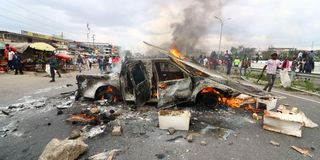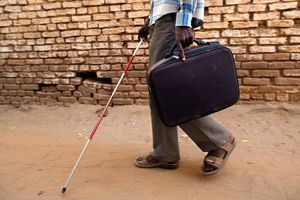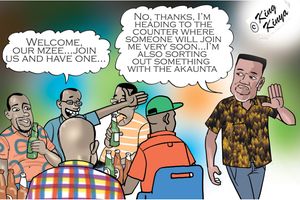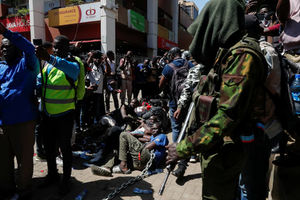
The shell of a police vehicle burnt by protesters on Mombasa Road at Mulolongo on 12 July 2023 during the anti-government protests.
It seems like a tough time to be a Kenyan police officer—or is it? At the weekend, Police Corporal Paul Macharia was found beaten to near-death in a market in Narok, in Kenya’s Rift Valley.
A week earlier, Kenya’s mainstream and social media were abuzz with the story of 19-year-old university student Ian Njoroge, who was filmed beating a police officer like a drum for arresting him after he allegedly violated traffic rules at Kasarani, Nairobi. The striking thing about the Njoroge incident was the flair with which he beat the officer.
And in Nandi, again in the Rift Valley, a police officer identified as Sammy Maritim was bludgeoned by residents in the middle of the night. There was a tragically comical twist to this one, as the policeman had gone searching for his missing girlfriend. His crime was that he was shouting too loudly during the search, disturbing the residents’ sleep.
In the past few years, there have been several incidents of attacks on police officers. The scuffles between alleged corrupt traffic police seeking to shake down motorists, and their victims, were common fare. There were a couple of incidents of policewomen slain, almost casually, by their boyfriends. Still, this year, while the violence might be more dramatic than in the past, it is less deadly.
Top 10 African economies
An indicator of the underlying factors driving these attacks on the police can be found in the fact that it is a problem plaguing many of the top 10 African economies (especially in Sub-Saharan Africa), which can claim to be electoral democracies.
The continent’s largest economies (by gross domestic product) are South Africa, Egypt, Algeria, Nigeria, Ethiopia, Morocco, Kenya, Angola, Angola, Cote d’Ivoire and Tanzania. Of these, two—Nigeria and South Africa—have nearly the same level of freewheeling and, sometimes, sharply divisive electoral politics as Kenya.
While the rest have reported between zero to six police officers killed so far this year, Nigeria and South Africa are off the charts. In April, the South African police service revealed that, in the previous 11 months, 36 police officers had been killed while on duty, many of them by armed criminals. In Nigeria, at least 26 police officers have been killed so far this year. These numbers are striking, considering that neither of these countries are at war.
But Kenya has hit and even surpassed those levels in the past. In December 2022, Interior Cabinet Secretary Kithure Kindiki said 53 police officers had been killed in the line of duty in the previous year.
‘Maandamano’
That number fell to 37 police officers killed in the line of duty between November 22, 2022 and November 23, 2023. So far this year, at least three Kenyan police officers are reported to have been killed by civilians. The difference between the past two years is greater than day and night.
It could be because it comes in a time of relatively low levels of conflict between civilians and police—unlike during the anti-government “maandamano” protests early last year or previous periods when election campaigning was marred by violence.
Still, by contrast, there are no reports of police officers in otherwise peace-loving countries, such as Malawi and Zambia, where the people are not known to have fiery temperaments, or in Egypt or Eritrea, where the price of doing so would be high—like burn down the entire offending town or suburb.
In Kenya, the police are, perhaps, the most visible unelected authority and symbol of the state on the street. More so than in Tanzania, for example. As in several other African countries, the state also announces itself loudly by way of big four-wheel-drive cars whizzing by in convoys with police escorts and flags flying, but those are quickly gone and their contents become inaccessible to the mwananchi behind their walled-off and high-fenced offices and homes.
Fear factor
The police officer is the one who walks home through an unlit back street or dark alley and drinks in the local pub. Unlike the also fairly visible men and women of the General Service Unit (GSU) paramilitary police formation, they are lightly armed or not all. There is, therefore, less of a fear factor about them. There are few Kenyan civilians, even those as drunk as a kite, who will jump a GSU officer.
The police is, therefore, a platform of low-risk contest against the state. But it is also the arena where the fury of the country’s electoral politics and its geopolitical terrorism dynamics are played out.
The available information indicates that at least 157 Kenyan police officers were killed in 2021, in the run-up to the 2022 election, with a large number of them felled by Al-Shabaab militants who had infiltrated the country or by their roadside improvised explosive devices (IEDs) blowing up a security vehicle. The next worst year was 2016/17, in the lead-up to the August 8, 2017 vote. Then, at least 97 Kenyan police officers were killed that year.
Who is it who said democracy is expensive?
Mr Onyango-Obbo is a journalist, writer and curator of the “Wall of Great Africans”. @cobbo3





